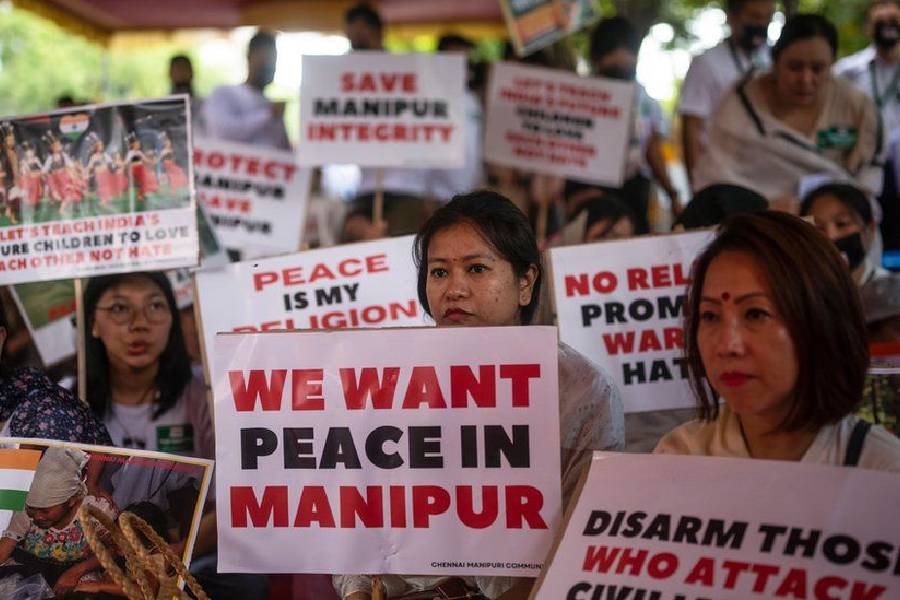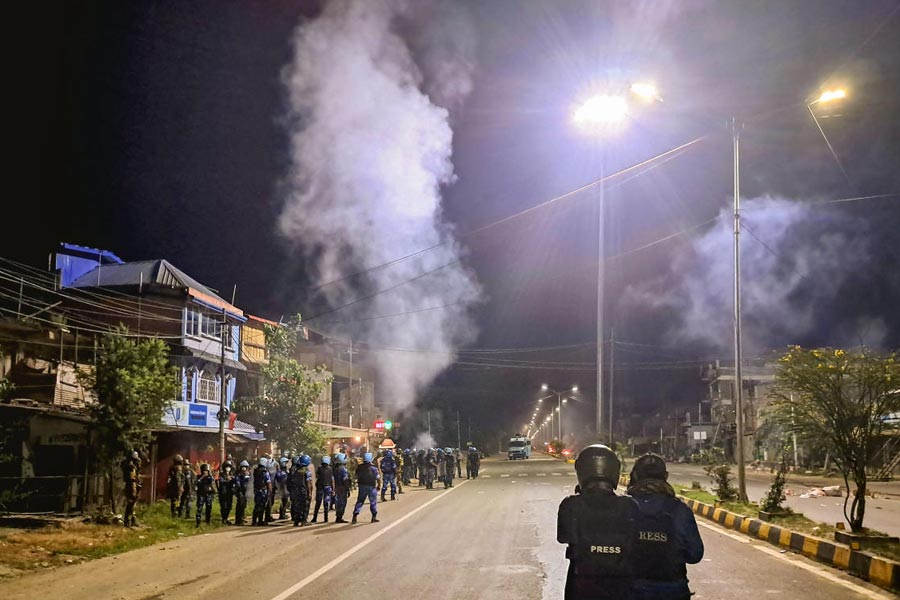RSS chief Mohan Bhagwat’s query on “who actually fuelled” the ongoing Manipur conflict evoked a volley of questions on Tuesday from a leading Kuki-Zo organisation in the state.
Bhagwat had also asked in Nagpur whether “outside forces” were responsible for the violence in the “border state” since May 3 that has left at least 177 people dead and over 67,000 displaced.
The Indigenous Tribal Leaders’ Forum (ITLF), a conglomerate of recognised Kuki-Zo tribes in Churachandpur district, responded in a media statement that some “other relevant questions need to be answered” first.
The statement, issued by Ginza Vualzong of the ITLF’s media and publicity wing, asked:
• “Why were there no clashes between the majority Meiteis and the Kuki-Zo tribals in all the years before the BJP and chief minister N. Biren Singh came to power in the state?”
• Why had Meitei “belligerence” become pronounced and quickly intensified during Singh’s tenure?
The BJP has been heading a coalition government since 2017 under Singh, who is serving his second term.
• Why has the Armed Forces Special Powers Act (AFSPA) been “removed from only Meitei-dominated districts and not from tribal areas”?
Nineteen police stations in Manipur’s valley districts are exempted from the AFSPA, which gives unbridled power to the security forces to search, arrest and shoot during operations in areas declared as disturbed. The Meiteis live in the valley. The Kuki-Zo and Naga tribal populations live in the hill districts.
• How did “gun-toting and hate-spewing (Meitei) radical groups” like Arambai Tenggol and Meitei Leepun gain “prominence” in the past couple of years?
• Why was the government notification of 1966 regarding “reserved” and “protected” forests under the Indian Forest Act, 1927, “suddenly implemented” in 2023, without “following procedures laid down” by the Act, which includes consulting the stakeholders?.
• Why there was a “sudden resurgence” in the Metei demand for Scheduled Tribe status, the “branding” of Kuki-Zo tribals as “illegal immigrants” and the blaming of tribals for the state’s drug menace?
The statement said: “...What Manipur witnessed in the past few years was a highly coordinated assault on the rights and protections that tribals enjoyed under the Constitution, all in the name of preserving and extending the Meiteis’ domination of minorities. Ironically, it included an attempt to get a minority tag in the form of ST status. This resulted in a pushback by tribals in the form of protests and rallies.”
The Meitei are mostly Hindus while the Kuki-Zo tribals are mostly Christian. Chief minister Singh, who is himself a Meitei, has been blamed by the ITLF for the unrest.
The ruling BJP and leading Meitei organisations and individuals have maintained that the influx and narco-terror outfits from Myanmar were fuelling the unrest in Manipur.
The Kuki-Zo people share the same ancestry as the Kuki-Chin people from Myanmar and Bangladesh. Manipur shares a 398km border with Myanmar, of which less than 10 per cent is fenced.
On Tuesday, Singh tweeted about the arrest on Monday of two members of the Myanmar-based Kuki-Chin Liberation Army (CKLA) from Churachachandpur district with sophisticated arms and over RS 4.8 lakh in cash.
He had earlier referred to the National Investigation Agency (NIA) taking up cases “wherein it was particularly stated that there exists a transnational conspiracy by Myanmar and Bangladesh based leadership of terror outfits to wage war against the Government of India by exploiting the current unrest in Manipur”.
“Today’s apprehension of CKLA cadres and the recovery of weapons has yet again underscored a transnational plot aimed at destabilizing both Manipur and our nation,” he said.
Lynching
On October 20, a Pangal (Meitei Muslim) driver, S. Sahir, died of injuries he suffered at the hands of a mob in the capital Imphal while transporting cows, prompting a joint action committee formed on October 22 to demand the arrest of those involved within 48 hours from October 23, and handing over the case to the CBI/NIA. Another driver was injured.












